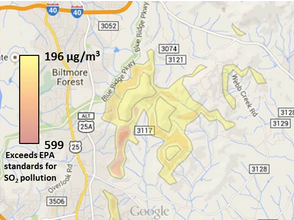Asheville’s Bent Creek is one of the most popular recreation areas in the mountains. Trail runners and mountain bikers fill the trailhead even on weekdays, along with dog walkers and hikers. But Bent Creek has a dirty secret: pollution levels there exceed the EPA’s health limits, thanks to a coal-fired power plant only a few miles away.
 Duke Energy’s Asheville coal plant has threatened local public health for decades. A new air modeling study by Air Resource Specialists shows that concentrations of sulfur dioxide in the air downwind of the power plant near Bent Creek, the Blue Ridge Parkway, and Pisgah National Forest are up to 3.5 times higher than what EPA has determined to be safe. Outdoor enthusiasts in these areas have been breathing dangerously unhealthy air one out of every three to four days since 2010.
Duke Energy’s Asheville coal plant has threatened local public health for decades. A new air modeling study by Air Resource Specialists shows that concentrations of sulfur dioxide in the air downwind of the power plant near Bent Creek, the Blue Ridge Parkway, and Pisgah National Forest are up to 3.5 times higher than what EPA has determined to be safe. Outdoor enthusiasts in these areas have been breathing dangerously unhealthy air one out of every three to four days since 2010.
Even worse, active outdoor enthusiasts breathe harder and gulp even more polluted air into their lungs, making them even more vulnerable and affected by dangerous sulfur dioxide levels. Sulfur dioxide triggers asthma attacks, airway constriction, and other respiratory problems. Exposure to this pollution for even five minutes can make it hard for a person to breathe, and high levels of SO2 can send people to the emergency room.
Fortunately, there’s an easy fix. Duke Energy already has the pollution control devices installed on these smokestacks to reduce their pollution levels. They just haven’t been operating them at full capacity in recent years to save costs. Duke can also burn coal with lower sulfur content.
However, Duke won’t operate their pollution control equipment at full capacity or use low-sulfur coal unless they have to. Their permit is up for renewal, and the only way to force Duke to clean up its act is for the permit to require them to do so. A public hearing on April 29 at 6 p.m. at Erwin High School will be pivotal.
If you can’t attend the public hearing, email the WNC Regional Air Quality Agency. Ask that Duke’s permit require low-sulfur coal and pollution control devices to operate at full capacity to meet the EPA’s sulfur dioxide limits for public health.
For more details about the public hearing and to learn more about pollution in Pisgah, click here.








